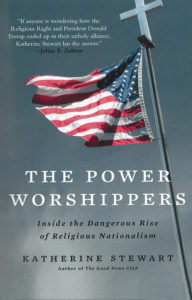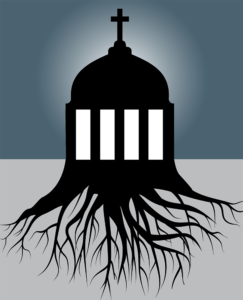The Power Worshippers: Inside the Dangerous Rise of Religious Nationalism

BY KATHERINE STEWART
BLOOMSBURY PUBLISHING, 2020
352 PP.; $28.00
The mainstream media depicts the religious right as a monolithic group of evangelicals focused on cultural issues like abortion and same-sex marriage. In this telling, as these mostly white men rise in power, they become increasingly obsessed with human sexuality—and with controlling women’s bodies in particular.
This depiction has some merit, as evidenced by the swath of executive orders and legislation penned under the Trump administration aimed at annihilating the rights of those who live outside this missional mindset. However, in her latest book, The Power Worshippers, Katherine Stewart chronicles how this group evolved into a Christian nationalist movement that’s far more well-heeled than the fringe right-wing rallies so often portrayed by the media.
In the opening pages, Stewart welcomes readers to join her on an exploration of the inner workings of an expansive group more concerned with wielding the tools of political power than picking up the sword as crusaders in the culture wars.
I will introduce you to the movement’s power players and the foot soldiers. I will tell their stories, in their words, though my real subject is the political vision that ties them together. I will take you to gatherings in Northern California, where agri-business men team up with pastors who have direct access to the Trump White House; to North Carolina, where Christian nationalist leaders recruit clergy to their partisan activism; to Arizona, where charter school operators with sectarian agendas are indoctrinating schoolchildren on the taxpayer’s dime; and to Verona, Italy, where American representatives of what they call a “global conservative movement” gather with international far-right leaders to declare war on global liberalism. We will revisit the strategy meetings of the late 1970s in which it was decreed, several years after Roe v. Wade, that abortion would be packaged and sold as the unifying issue of the movement.
 In the ensuing pages, Stewart uncovers these stories with the skill of a seasoned investigative journalist, weaving together historical analysis and on-the-ground reporting to create engaging narratives. She traces how, in recent decades,
America’s houses of worship lost their ability to be a welcoming home for a range of societal issues by morphing into a mouthpiece for the Republican Party.
In the ensuing pages, Stewart uncovers these stories with the skill of a seasoned investigative journalist, weaving together historical analysis and on-the-ground reporting to create engaging narratives. She traces how, in recent decades,
America’s houses of worship lost their ability to be a welcoming home for a range of societal issues by morphing into a mouthpiece for the Republican Party.
The Power Worshippers offers a behind-the-scenes view of how an interconnected network of think tanks, advocacy groups, and pastoral organizations joined forces with global anti-democratic religious nationalists long before entities like Russia became players in the 2016 presidential election. The book also documents how these enterprises were funded by wealthy donors and family foundations. Included in this mix are names like Robert Mercer and Betsy DeVos, who later funded Donald J. Trump’s quest for the Oval Office.
One would expect Stewart to encounter familiar faces like Jerry Falwell and Tony Perkins as she travels throughout Christian Americana. Other figures who’ve been more clandestine are brought to light—people like Ralph Drollinger, who wields influence leading a weekly Bible study at the White House attended by cabinet secretaries, Vice President Mike Pence, and other officials.
When one views Stewart’s work alongside Ann Nelson’s reporting on the Council for National Policy (in her book Shadow Network: Media, Money, and the Secret Hub of the Radical Right) and Jeff Sharlet’s extensive reporting (most recently profiled in the Netflix documentary The Family), a truly god-awful tapestry emerges.
Indeed, this theocratic weaving illuminates a capitalistic form of Christianity, but its disparate threads don’t come together in any physical headquarters or charismatic figurehead who speaks as a national representative. As Stewart observes, “There are simply a number of familiar faces, a variety of old and new hats, and a swarm of acronyms.” Yet, as she adroitly observes, the lack of any central organization doesn’t diminish this movement’s ability to act effectively and decisively. “The unity of Christian nationalism, as ever, is to be found in its distinctive political vision.”
Stewart points out that the biggest fraud of Christian nationalism—that the United States was founded as a Christian nation—is also the movement’s greatest weakness. She debunks its insistence that the wall of separation between church and state is a latter-day fiction concocted by secular liberals, noting how this principle was written into the very fabric of the Constitution. If Americans want to defend against this distorted notion of religious liberty advanced by Christian nationalists, Stewart argues they don’t need to come up with a new principle to counter their claims. “We just need to reclaim the genuine religious freedom that our founders established and that most of our citizens cherish.”
Stewart suggests that progressive faith leaders could take up this mantle by reclaiming the pluralistic and inclusive nature of the Christian faith. They could be the ones to rebuild the wall of separation. However, I’m not convinced the religious left has the people power and political will to mount an effective counterattack against the religious right. Even in Democratic circles, one can find connections to the secretive fundamentalist networks explored in The Power Worshippers. Take, for example, Hillary Clinton’s praise of the late Doug Coe, long-time titular head of The Family. Other progressive leaders with similar connections include pastor/sociologist Tony Campolo and Jim Wallis of Sojourners.
However, because humanists have no vested interest in organized religion, they are in a unique position to break this gridlock. A first step is to share this book and others referenced herein with progressive Christian friends in the hopes they’ll be moved to press the religious leaders in their midst to stop being power enablers and instead try to break the political power structures embedded in the institutional faith.
